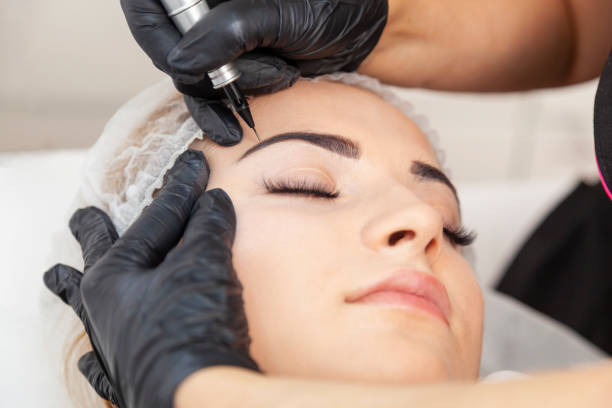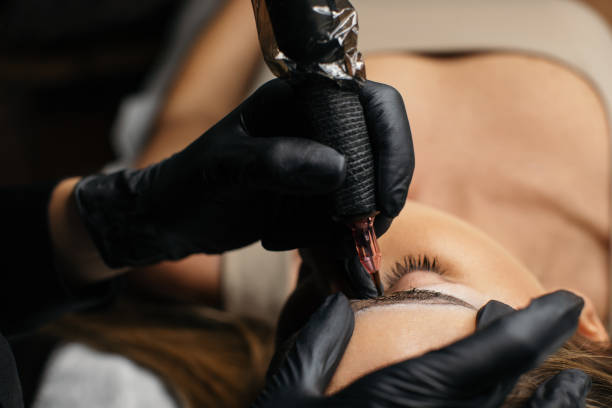In Australia, the tattoo industry is heavily regulated, with tattoo artists required to obtain a license to legally practice their craft. Whether you’re an aspiring tattoo artist looking to start your career or a seasoned professional considering a move to a different state, understanding the licensing requirements is crucial. This article will guide you through the complex array of laws governing the tattoo industry across Australian states and territories. From the necessity of cosmetic tattoo course to state-specific regulations, we’ll cover everything you need to know about obtaining a tattoo license in Australia.
Tattoo Licensing Laws in Australia

State-by-State Regulations
New South Wales
In New South Wales, obtaining a tattoo license is mandatory for all tattoo artists. Applicants must undergo a criminal background check and complete a course on infection control before they can be deemed eligible for a license. The application process also includes submitting personal identification documents and paying a non-refundable fee.
Victoria
Victoria has stringent requirements for aspiring tattoo artists. To obtain a license, individuals must complete specific cosmetic tattoo courses and undergo practical training under a licensed professional. The application process also requires a detailed business plan outlining the safety measures you will implement in your studio.
Queensland
Queensland mandates that all tattoo artists hold a valid tattooing license. The rigorous application process includes a police check, verification of qualifications, and an inspection of your tattoo studio. Renewal of the license is required every three years, and failing to comply with regulations can result in hefty fines.
Western Australia
The licensing process in Western Australia involves a combination of theoretical and practical examinations. Candidates must complete an accredited training program and pass a health and safety exam. Licenses must be renewed biennially, and ongoing education in areas like infection control is necessary to maintain certification.
South Australia
South Australia has specific laws targeting the tattoo industry, making it compulsory for tattoo artists to have a license. Applicants need to complete training in cosmetic tattoo courses and undergo a comprehensive criminal history check. The licensing board also performs periodic inspections of tattoo studios to ensure compliance with health and safety standards.
Tasmania
In Tasmania, the process of obtaining a tattoo license involves completing an approved training program and passing a practical skills assessment. The licensing authority also requires evidence of public liability insurance and a clear criminal record. Renewal of the license is required every five years, subject to continuing education credits.
Australian Capital Territory & Northern Territory
Both territories have unique regulations for tattoo licensing. In the Australian Capital Territory, applicants must complete infection control training and pass a proficiency test. The Northern Territory requires a more detailed application process that includes studio inspections, background checks, and proof of insurance coverage.
National Standards
Most Australian states and territories adhere to national standards for hygiene and safety, ensuring a unified approach to public health and safety in the tattoo industry. Compliance with these standards is mandatory, and failing to meet these requirements could result in penalties or loss of licensure. Each state may have additional, specific rules, but the overall aim is to maintain high levels of hygiene and safety across the country.
Why Licensing is Crucial for Tattoo Artists

Hygiene and Safety
One of the primary reasons for stringent licensing requirements is the need for high hygiene and safety standards in the tattoo industry. Licensed tattoo artists are trained to follow health regulations that protect both the artist and the client. Proper hygiene practices help prevent the spread of infectious diseases, ensuring a safe environment in tattoo studios.
Professional Credibility
Obtaining a license enhances a tattoo artist’s professional credibility. Clients are more likely to trust and choose a licensed artist, knowing that they adhere to legal and health requirements. Holding a license can significantly boost your reputation, helping you attract more clients and grow your business.
Legal Consequences
Operating without a valid tattoo license in Australia can lead to severe legal consequences. These can include hefty fines, imprisonment, and even the closure of your tattoo studio. The repercussions are not limited to financial penalties; operating illegally can tarnish your professional reputation and make it difficult for you to obtain a license in the future.
How to Obtain a Tattoo License in Australia
The application process for obtaining a tattoo license varies by state but generally includes several key steps. These steps are crucial for ensuring that only qualified individuals receive a license.
- Submit an application form available from your state’s licensing authority.
- Provide personal identification documents and a recent photograph.
- Pay the application fee, which can range from $100 to $500, depending on the state.
- Undergo a criminal background check.
- Complete a course on infection control.
Required Training and Certifications
To become a licensed tattoo artist in Australia, you must complete specific training and certification programs. This often includes cosmetic tattoo courses, which cover essential topics like hygiene, safety, and technical skills. Here is a comparison of some training requirements across different states:
| State | Training Requirement |
|---|---|
| New South Wales | Infection Control Course |
| Victoria | Cosmetic Tattoo Courses, Practical Training |
| Queensland | Accredited Training Program |
| Western Australia | Health and Safety Exam |
| South Australia | Criminal History Check, Studio Inspection |
The training and certification process ensures that all tattoo artists are well-equipped to provide safe and professional services to their clients. These programs also keep artists updated with the latest industry standards and techniques.
Renewal and Continuing Education
Once you’ve obtained your tattoo license, it’s essential to keep it renewed and stay updated with continuing education. Renewal periods can vary from state to state, usually ranging from two to five years. Continuing education courses often cover new techniques, updated health regulations, and other critical topics to help maintain the quality of your services.
- Check the renewal period for your state and mark your calendar accordingly.
- Complete any required continuing education credits before your license expires.
- Submit a renewal application along with a renewal fee, if applicable.
Conclusion
In conclusion, obtaining and maintaining a tattoo license in Australia involves navigating a series of state-specific regulations designed to uphold high standards of hygiene, safety, and professional integrity. Completing necessary training courses, like cosmetic tattoo courses, is crucial for compliance and skill development. Licensing not only ensures legal operation but also builds credibility with clients, enhancing your career prospects. It is vital for aspiring and current tattoo artists to adhere to these regulations to maintain the integrity and safety of the tattoo industry.
FAQs
1. What happens if I tattoo without a license in Australia?
Operating without a valid tattoo license can lead to legal consequences, including fines and potential closure of your tattoo studio.
2. Do apprentices need a license to tattoo in Australia?
Apprentices typically do not need a license to learn under a licensed professional but must adhere to the regulations set by each state.
3. How long does it take to get a tattoo license in Australia?
The processing time can vary by state, but it generally takes several weeks to a few months, depending on the completion of required training and certifications.
4. Can I use my tattoo license in multiple Australian states?
Licenses are generally state-specific, and you may need to apply for a new license if you wish to practice in a different state.
5. Are online courses acceptable for tattoo licensure?
Some components of the required training may be available online, but hands-on training and practical experience are typically necessary for full certification.
